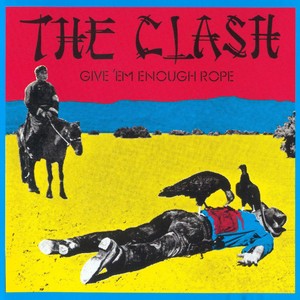
Give'em Enough Rope's Cover
It is amazing how wrong both the critics and the public can perceive an album when it is first released. The Clash’s second record is a case in point. The album was released in 1978, and it was largely panned. Most of the criticisms I have read focus on the producer that was chosen, a Sandy Pearlman (famous for his work with harder-rocking outfits). The truth is that the album is the most natural evolution of the sound The Clash had presented on their first offering you could ever picture.
In actuality, it is hard to imagine how an album that starts up with “Safe European Home” could cause a bad impression on the listener. The song is one of their best style explorations, melding a call-and-response lyric with a bestial wall of riffage that eventually gives way to a reggae excursion. You know what? That song alone justifies buying the album, especially since it is omitted on “best of” packages. The album as a whole has never got the recognition it deserves. In fact, when the “From Here To Eternity” live CD was issued in 1999, not a single song from “Give’em Enough Rope” was included. Not even “Tommy Gun” (the third track here) was featured. That song showcases that the political vision of the band was advancing both at a steady rhythm and in a focused way. It was Strummer’s homage to mercenaries, and a study on violent types and their motivations. The drums emulate a machine gun all the way through, and the sudden ending makes it all feel as if a grenade had been lodged into the brain of the listener through the song, only to explode at the song’s conclusion.
Sandwiched between “Safe European Home” and “Tommy Gun” is their take on the traditional song “When Johnny Comes Marching Home Again” (renamed “English Civil War” by The Clash), with enough lyrical changes to make a victory song turn into a lament of futility. What was it F. Scott Fitzgerald once said? “The victor belongs to the spoils”. This song makes the same point, and it acts as true reminder of the humanity that was rooted at the very heart of the original punk movement. Life is cheap, death is cheap. Is there a way to turn that on its head? How many barriers must be blown away until conscience has a clear way to go forward?
The album, then, opens with a killer hat-trick. And the rest of the disc (while not up to that standard) does not feel that much of a let down. “Last Gang In Town” is a tale of “territorial pissings” to quote the late Kurt Cobain, and one that bears a measured melody and arrangement which lets you focus on the story itself. On the other hand, Mick Jones sings “Stay Free” and salutes a former acquaintance of wilder days who ended doing time. The song is hard in the sense that this fellow has regained his freedom, and Jones virtually implores him “go easy…step lightly…stay free” at the end of the song before launching into the guitar solo of the album. What makes that moment all the more poignant is that both band and listener know how that story will end all too well.
That is something about this album. They all were leaving their teen years behind, and seeing more of the world. “Safe European Home” was inspired by a near-fatal trip to Jamaica, and the loud “Cheapskates” (the penultimate song) showcases that the game of fame is a game where the rules are so clearly written down than even a blind one can see them and enforce them. And the closing “All The Young Punk” has one of the best melodies on the whole record, and ends up painting a picture of the punk scene so accurate at the time that one can but wonder how the band had developed that insight in just over a year. To me, the answer might be that they were ahead of the curve all along.
By my admission, only three songs do lower the appeal of the album. “Guns On The Roof” was a telltale sign that not every band member should sing, whereas “Drug Stabbin’ Time” was too slight in the context of the record to make a strong impression. It would have fitted better on the debut. For its part, “Julie’s Been Working For The Drug Squad” is a goofy tune that predicts some of the least effective music on their forthcoming LPs.
So, there you have it. The least popular Clash record is a very satisfying album on the whole. It is also considered their last “punk” record, so that if you like their louder side you will be in cloud number nine. And it has enough lyrical and structural substance to let you understand the musical adventures that were around the corner.
Rating: 8/10

Pingback: The Clash – General Introduction | MusicKO